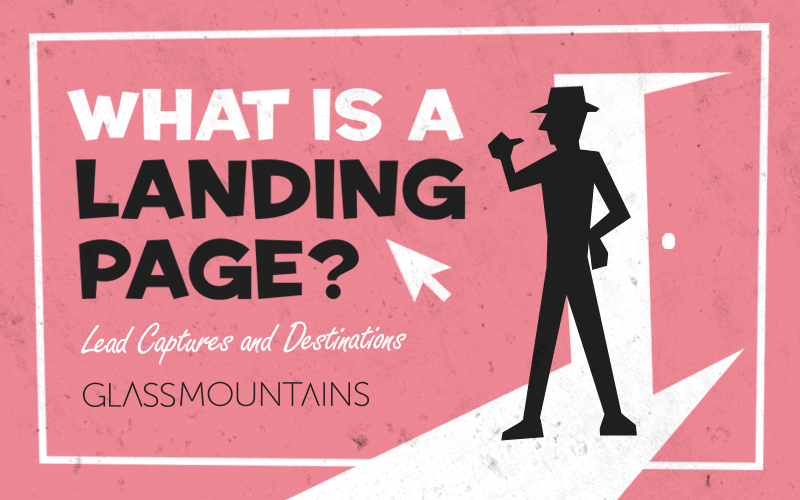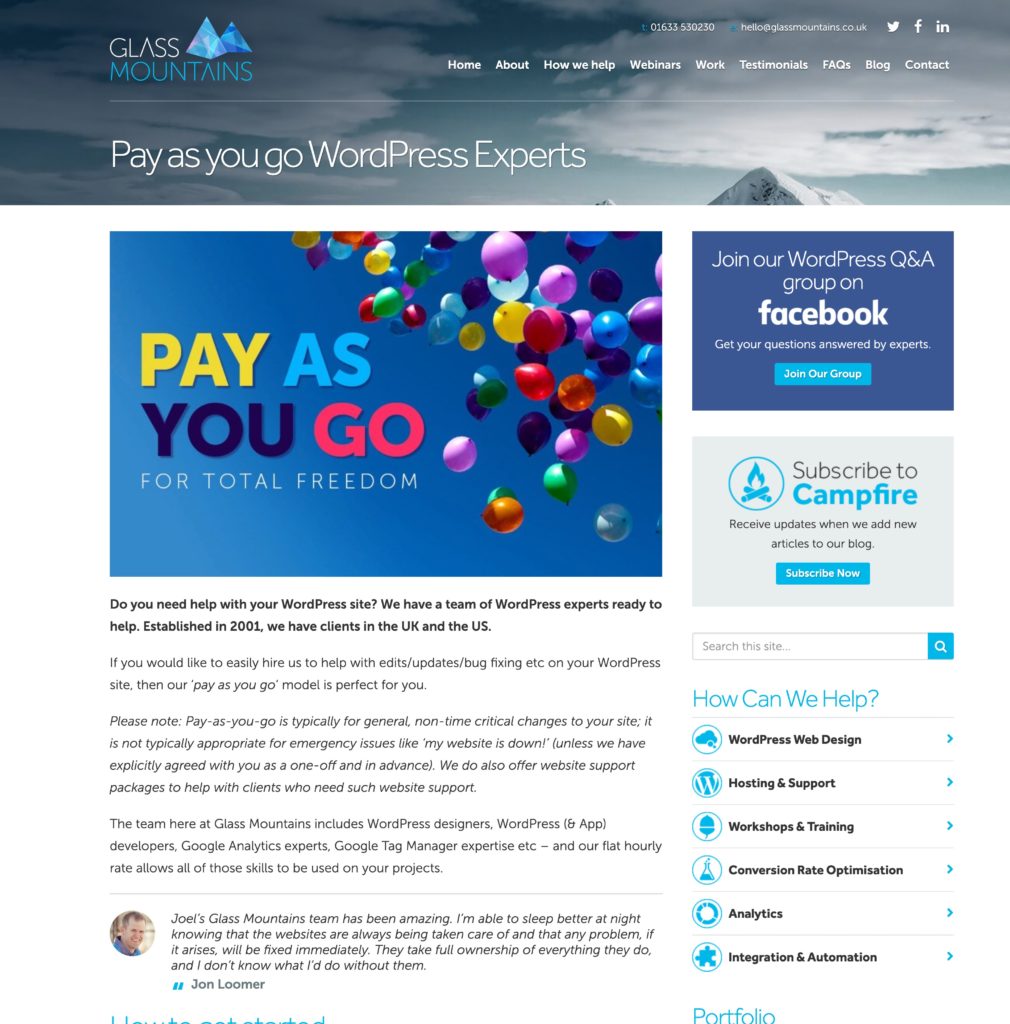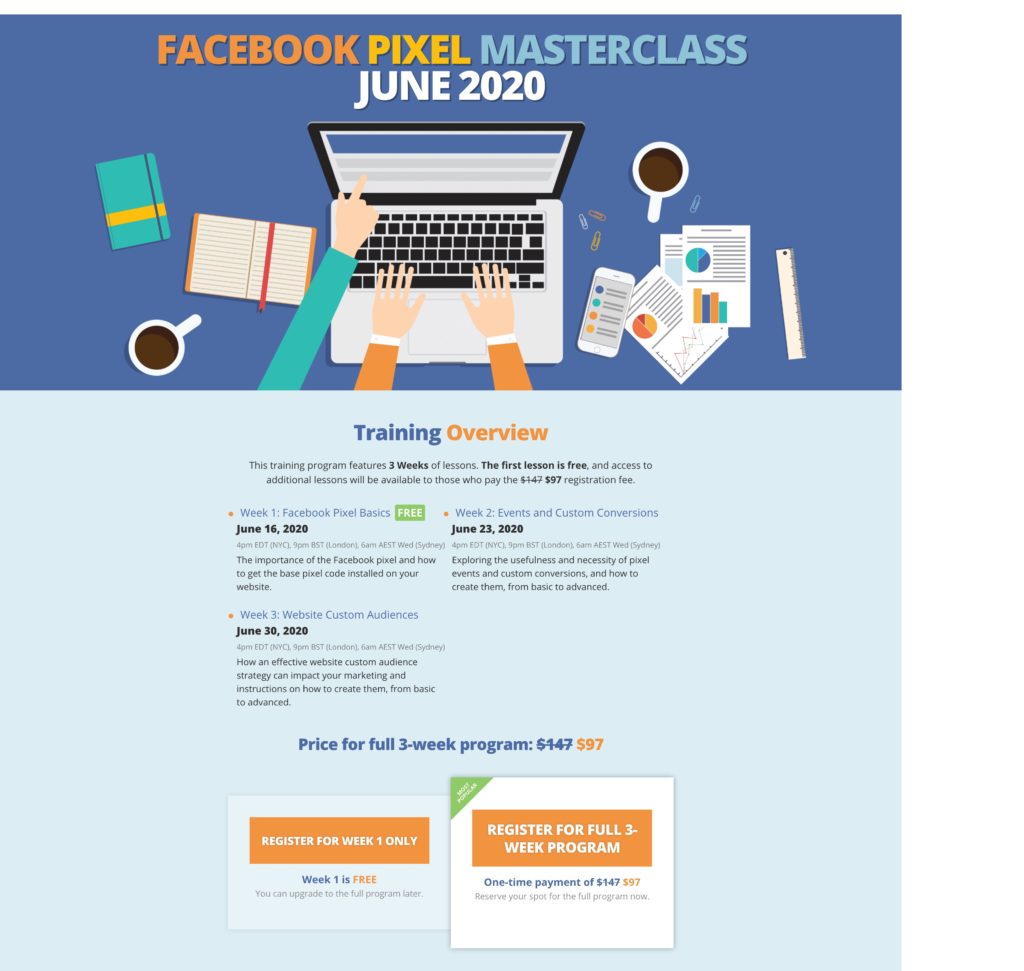What is a Landing Page?

I saw a comment online the other day and it was something like ‘hey, do I need a website? Or is a ‘landing page’ better?“.
Now I can kind of understand why the person asked this question, as the very phrase ‘landing page’ conjures up images of something highly specialised & different to normal web pages which, in one a way it is, but, in another way it isn’t….I’m not helping here, am I?! Ok, let me try again….
A landing page is nothing more than a page on a website.
So, it’s a normal web page?
Yes, it’s normal in the sense in that it’s built in the same technology as all other web pages.
The difference lies in its purpose….
What is a landing page for?
A landing page is designed (through its content and visual look) to serve a single specific purpose – to resonate with very specific web traffic.
Landing pages tend to be fairly simple by design and they often do not show the main website navigation or a sidebar. That’s because the aim here is trying to eliminate distractions; to get the audience to ‘read the message, & take the action‘.
Another key point about landing pages is where they get their traffic from: many landing pages are created to be the destination that people are sent to when they click on a pay-per-click advert.
Pay-per-Click advertisements
When you create a pay-per-click ad you are typically promoting an individual product or service. So you want to send people to a specific page on your site which is focussed solely around that particular product or service.
Now, if your company only does one thing – then perhaps your homepage is also the ideal landing page – it really depends. Although you may still also elect to create advert specific landing pages for testing purposes – to see what copy and messaging resonates with your audience.
Organic
Landing Pages are not just for use with paid pay-per-click adverts though, they are for normal, free organic SEO as well (remember organic SEO is basically where we want Google etc to show our pages when people search for things).
We have a page which offers our pay by the hour service for people or businesses who need quick help with WordPress – above is how that looks on Google. The above links to this page:
Our Pay-as-you-go WordPress expertise page
So, when you think about, that above is a ‘landing page‘. When people click on the Google Search result link in Fig 1, that is where they ‘land‘ when they get to the Glass Mountains website. On a page which specifically relates our concept of pay as you go – not all our other services, we offer, no, just the pay as you go service.
Note: eagle-eyed readers may notice the comedy typo in Fig 1, this is in the process of being rectified. The people responsible will be severely punished – ok, it was me. I’ll let myself off with a promise to be more careful when entering my Yoast SEO Descriptions in future.
So are all pages ‘Landing Pages’?
The answer is probably ‘yes‘ if we consider landing pages to be pages that the web visitor can start their website journey – i.e. all the posts and pages we create on our WordPress site can be indexable by Google, and therefore can theoretically show up in Google’s search results. People can click on those links, and can land on any of our pages.
Examples
Let’s take a look at some examples to help drive the point home….

Fig 2 – landing page example
So Fig 2 shows our Pay-as-you-go page I mentioned earlier. Now, if I were to use this as a landing page for a paid advert I might be tempted to create an alternate version of this which had a few changes:
- Minimise the header
Make the global header and top navigation even smaller (or remove); focussing the visitor on the page message instead, and removing opportunities for them to click away and get sidetracked. - Remove the sidebar
I typically like a sidebar because if someone can land on any page on our website, then a sidebar can help set the overall tone for the website, leaving the main content to show the page-specific message (and if we follow this logic, I would be better off amending our sidebar so the top element reinforces who Glass Mountains are, and what we do etc – I’ll add that to my list!). - Spice up the introductory text
The opening area of the main content looks a tad dry, paragraphs of text, perhaps break it up with a graphic or, better still, a ‘call to action‘ button directing the website visitor to do something (e.g. “Buy hours now!“, which would jump them down the page to the relevant point).
Let’s now take a look at another example from our of our client sites: Jon Loomer is a Facebook Ads expert and regularly runs online training to help people improve their Facebook Ads
The above example is from Jon’s Facebook Pixel Masterclass. Jon runs Facebook pay-per-click Ads that, if the person clicks on the ad, they’ll end up on the above page on his site. For this reason, this landing page has been stripped back with i) hardly any header or top navigation dor the website, ii) no sidebar – as we do not want to allow visitor’s attention to wander – we want them focussed on the key message, focussed on the offer, and focused on the call to action.
Building Landing Pages
Landing pages can be built exactly the same as any other pages within WordPress. Most WordPress themes support a full-width template which means that your page can display without a sidebar. Your theme may also support a template which minimises the header (i.e. remove the top navigation) – if it doesn’t then you could always upgrade to a theme that does, or perhaps use our pay as you go service to create such a template for you :)
Landing Page Services
Another route to creating landing pages is to use one of the many third-party apps out there such as:
With services such as these, you’ll create an account, and then you can use their very user-friendly, slick, visual editors to create complete landing pages. The next step is to embed the newly created landing page back on your own website. All of the above offer a WordPress plugin which makes this process even easier.
If you’d like me to do a demo video of using one of the above services, please let me know but the reason I’m not doing it by default is that for most people, those services are overkill; you have a WordPress site so you already possess the basic tools to achieve this anyway. These landing page generator services come with extra functionality which though undoubtedly useful (especially on high traffic situations), do come with drawbacks:
- They cost money
- They will incur a performance hit on your website
And in truth, it’s point 2 we need to be increasingly mindful of. Every time we add a new script etc to our website, it slows it down a fraction. Google is on a mission to promote websites which are lean & fast, and we need to be very mindful of whether we really need that plugin/script running on our website. A lot of the performance-enhancing work we do at the moment starts with putting all the scripts contained on a website under a microscope and auditing them, weeding out what we don’t strictly need.
For instance, Jon Loomer originally used another third party landing page system. It caused problems in certain circumstances and, on investigating, we decided to ditch the service and create the landing pages natively in WordPress.
That is not to say you should never use these landing page generator services – just that should use them with an open mind.
Final Thoughts
I would argue that this ‘landing page’ mentality where we keep our messaging clear and focussed, and where we direct website visitors to relevant call to actions, is something that you want to apply to pretty much all your website pages.
If you’d like top to discuss landing pages first, feel free to join our free WordPress Q&A group on Facebook.
Thanks
Joel
p.s. you might also be interested in some of our upcoming events.
Tags: Landing Pages
No Comments


